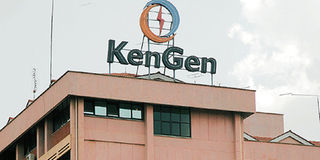Premium
November power prices ease on low forex charge

The Kenya Electricity Generating Company (KenGen) head offices in Nairobi.
What you need to know:
- Rapid slump of the Kenyan shilling against the US dollar in recent months has also had major ramifications on the cost of basic commodities.
- Kenya says its government-to-government deal for importation of fuel from the Gulf on a credit period of six months has slowed down the depreciation of the shilling.
The energy regulator has cut power prices for November by 1.2 per cent on account of a lower forex charge, but consumers were spared a larger drop in prices due to a higher uptake of expensive thermal energy.
In the latest monthly review of electricity prices, the Energy and Petroleum Regulatory Authority (Epra) has reduced the foreign exchange rate fluctuation adjustment (Ferfa) by 61 per cent to Sh0.80 per unit, down from Sh2.05 last month.
However, the fuel energy charge (FEC) has jumped by 16.1 per cent to Sh5.74 per unit – the highest since Sh8.30 in March – up from Sh4.94 last month, denying consumers the much need relief.
The significant drop in the forex charge has led to an overall reduction in electricity prices this month. For instance, Sh1,000 purchased 35.5 units for ordinary domestic customers, but the charge has dropped to Sh988 for the same quantity of power supply.
The marginal fall is set to be a timely boost for consumers especially large power users such as manufacturers whose power prices have risen steeply over the past year.
High power costs
To underline the pain that consumers are braving due to high power costs, former Mandera Senator Billow Kerow on Monday revealed the power bill for one of his businesses has doubled, leading to a strain on the operations of the firm.
“I have a small business operation where we were paying Sh3 million for our electricity bill every month. But this has now gone up to Sh6 million for the very same quantity of supply,” said Mr Kerow in his submissions to the National Dialogue Committee on Monday.
The rapid slump of the Kenyan shilling against the US dollar in recent months has also had major ramifications on the cost of basic commodities due to Kenya’s position as a net importer of goods and services.
Depreciation of the shilling
The Ferfa charge component of the power bill is a pass-through cost that enables Kenya Power to pay for energy bought from independent power producers (IPPs) as well as service its debt, most of which is foreign currency denominated.
Kenya says its government-to-government deal for importation of fuel from the Gulf on a credit period of six months has slowed down the depreciation of the shilling from three per cent per month to one per cent by reducing the scramble for dollars.
Consumers have, however, taken a hit from increased thermal power over the past month owing to water shortage in major dams leading to lower hydropower output.
In a statement this week, KenGen said its dams have started to swell thanks to ongoing heavy rains, which are expected to increase output of cheaper hydro power.

